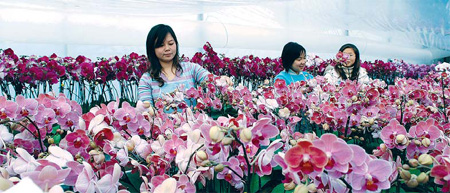chengdushuangliu2011
Farmers rent their land to city folk so they can stay and work on it
By Xu Xiao (China Daily)
Updated: 2011-06-01 08:24
 |
Large Medium Small |
|
Fairy phalaenopsis flowers help to raise the incomes of rural folk. Photos Provided to China Daily |
The farmers of Wenjiang have found some new ways to make money, other than just working the land, thanks to new district policies that benefit rural people.
Zhang Xianfeng, who was carefully attending to the flowers in his field when this reporter found him, said that he was not working for his own interest, but for that of other people.
"Although I work for others on my own farmland, I have a better income - more than 1,400 yuan ($215) a month. The company also pays my rent and my wife gets her monthly old-age pension of 850 yuan."
The elderly couple now have an annual income of 30,000 yuan, which is far beyond the amount they earned before.
"Young people go to the city to seek their fortune, and those who remain rent their land out to companies, and villagers above the age of 40 come to work," said Jiang Zhonglin, a local Party committee member.
"Many talented people who are already rich rent land and establish a company in our village. Those elderly people who knew nothing but farm work, leased out their land and hired themselves out to the companies, so they still deal with the earth they're familiar with - but get a better salary," Jiang noted.
According to agriculture development bureau personnel, the Wenjiang district has tried hard to find ways to increase farmers' income and narrow the wage gap between rural and urban people.
Now it has trained 36,240 farmers - or 85 percent - providing them with some useful techniques.
And, according to Jiang, while money is certainly important, leading a harmonious, happy life can be more important.
Another sign of Wenjiang's effort to bring the villagers self-government has been the allocation of housing - something the officials believe will bring harmony and happiness.
Jiang told reporters that the housing allocation respected the farmers' wishes and the government regulations.
To make sure that the allocations were above board, the community published the names of the people who got the housing and other needed information on. Anyone can see the procedure, officials said.
According to some district residents, Wenjiang is developing a democratic system that involves villagers in the decision-making process when it comes to public services and industrial development.
To get more villagers to take part in the management process, one part of Wenjiang district established a community service center in October 2010. It now has an art troupe, an information service center a public service center, and other groups taking part, too.
When a free gym was opened in 2011, community service groups pitched in to oversee its daily operation.
Mou Liang, a local county official, told reporters that, "Villagers take part in social affairs, so the government doesn't have to attend to odds and ends, and can concentrate on policy making, so it makes better development decisions for the people."
These days, Wenjiang has its eye on a modern rural complex that is both good for economic development and harmonious living.
"A city surrounded by farmland, a farming area within a city, and people dwelling in a pastoral environment - that's the blueprint for Wenjiang's future prospects."
(China Daily 06/01/2011 page47)
| 分享按钮 |
